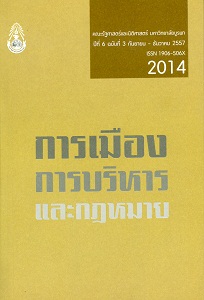คุณลักษณะของนักการเมืองไทยที่มีสายสัมพันธ์แบบตระกูลการเมือง
Keywords:
ตระกูลนักการเมือง, นักการเมืองที่มีสายสัมพันธ์แบบตระกูลการเมือง, สมาชิกสภาผู้แทนราษฎรของไทย, Political dynasties, Dynastic politicians, Members of the House of Representatives in ThailandAbstract
การสืบทอดอำนาจทางการเมืองจากรุ่นสู่รุ่นในวงศ์ตระกูลผู้นำทางการเมืองหรือที่เรียกว่า “ตระกูลนักการเมือง (Political Dynasty)” นั้น เป็นปรากฏการณ์ที่พบเห็นเป็นเรื่องปกติในประเทศประชาธิปไตย บทความนี้มีวัตถุประสงค์หลักสามประการ คือ ประการแรก มุ่งตอบคำถามว่านักการเมืองที่มีสายสัมพันธ์แบบตระกูลการเมือง มีคุณสมบัติส่วนบุคคลแตกต่างจากนักการเมืองที่ไม่มีความสัมพันธ์แบบตระกูลการเมืองหรือไม่ ในเรื่องใดบ้าง ประการที่สอง นำเสนอผลการวิเคราะห์เปรียบเทียบประสบการณ์ก่อนได้รับเลือกตั้งของสมาชิกสภาผู้แทนราษฎรที่มีและที่ไม่มีความสัมพันธ์แบบตระกูลนักการเมือง ประการที่สาม ทำการวิเคราะห์เพื่อหาคำตอบว่าสมาชิกสภาผู้แทนราษฎรที่มีหรือไม่มีความสัมพันธ์แบบตระกูลนักการเมืองได้รับการเลือกตั้งเข้ามาเป็นจำนวนมากเป็นพิเศษในบางภูมิภาคหรือไม่ และมีความแตกต่างกันมากน้อยเพียงใดระหว่างเขตเลือกตั้งในกรุงเทพฯและต่างจังหวัด อาศัยวิธีการวิจัยเชิงปริมาณทำการสำรวจและรวบรวมข้อมูลนักการเมืองที่มีความสัมพันธ์แบบตระกูลการเมืองจากผลการเลือกตั้งสมาชิกสภาผู้แทนราษฎรเมื่อวันที่ 3 กรกฎาคม พ.ศ. 2554 บทความนี้ยืนยันว่านักการเมืองที่มีสายสัมพันธ์แบบตระกูลการเมืองโดยภาพรวมมีความแตกต่างจากนักการเมืองที่มีสายสัมพันธ์แบบตระกูลการเมืองทั้งในเรื่องเพศ อายุ ระดับการศึกษา และประสบการณ์ก่อนได้รับการเลือกตั้ง ข้อค้นพบของบทความนี้แสดงให้เห็นว่าการดำรงอยู่ของตระกูลนักการเมืองในการเมืองเรื่องการเลือกตั้งของไทยนั้นเป็นพลวัต และกำลังมีการเปลี่ยนแปลงไปสู่รูปแบบที่สลับซ้ำซ้อนมากกว่าในอดีต ดังนั้น การวิเคราะห์ข้อมูลโดยอาศัยข้อมูลโดยการขยายขอบเขตการพิจารณาเรื่องตระกูลนักการเมืองให้กว้างออกไปโดยครอบคลุมถึงการมีสายสัมพันธ์แบบตระกูลการเมืองของนักการเมืองในการเมืองแบบอื่นๆ เช่น วุฒิสภา องค์กรปกครองท้องถิ่น จึงมีความสำคัญต่อการเข้าใจบทบาทและอิทธิพลของตระกูลนักการเมืองในระบอบประชาธิปไตยของประเทศไทยที่สมบูรณ์ยิ่งขึ้น
The Characteristics of Thai Dynastic Politicians
The existence of political dynasties, a sequence of political leaders considered members of the same family, in democratic country has been known for a long time. The purpose in examining these topics is three-fold: 1) to explain whether the socio-economic backgrounds of Thai dynastic politicians are different to those of the non-dynastic distinctions; 2) to investigate experiences before becoming a House of Representatives member of these two groups of politicians; and 3) to compare number and proportion of dynastic politicians by regions and between Bangkok and non-Bangkok constituencies. Relying on a quantitative method of examination using a data constructed from the 24th House of Representatives database, this article found distinctions between Thai dynastic and non-dynastic politicians in terms of gender, age, level of education, and politico-economic experiences. This article also asserted that the existence of political dynasties in the politics of House election in Thailand is dynamic and more complicated than in the past. Thus, further analysis expanding to cover dynastic politicians in other political institutions such as the Senate and the local government is required in order to understand even more clearly about the role and political power of dynastic politicians in the democratic polity of Thailand.






